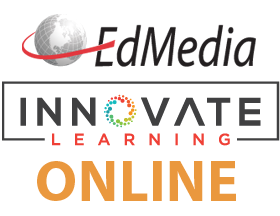Looking back, looking forward: An Interview with Chris Devers, Incoming Chair of EdMedia + Innovate Learning Online

Mirroring the experience of many international edtech professionals and researchers, my career has been thoroughly intertwined with the AACE community – read for example Gjoa Andrichuk’s reflection on how the conference has shaped her teaching practices over the years. My first AACE conference was the E-Learn 2007 in Quebec, Canada. Over the years, the community has changed: New conference formats were added for a while based on high demand for localized venues (Global Learn), conferences changed names and focus, from WebNet, to E-Learn to Innovate Learning, from iCAL to EdMedia. During the pandemic, new online formats replaced or augmented the traditional conference experience. Currently, the AACE conferences merged and consolidated to two annual events: the EdMedia Innovate Learning in-person conference in early summer, and the the EdMedia Innovate Learning online conference in November.
One thing has stayed the same since 1987: This is where you meet your friends. It is therefore my absolute pleasure to talk to Christopher Devers (@chrisdevers), education professor at Johns Hopkins University and incoming chair of EdMedia + Innovate Learning Online about his plans for next year’s online venue.
Chris, what was your first AACE conference? Anything you still remember?
My first AACE conference was Global Learn 2011 in Melbourne, Australia. I remember how excited I was to present my research, receive feedback, and to meet others from across the world that were interested in similar research topics. The conference was amazing, and I have been attending ever since!
How has the community influenced your career over the years?
Along with learning about new research and technologies, one of the outcomes of attending conferences is networking. I have stayed in contact with many of the attendees, even from my first conference in Australia. It is important to have mentors, and the colleagues that I have met at the conferences have provided insight when making career decisions, as well as provided invaluable feedback on manuscripts and research lines.
As a learning scientist, you are interested in situational affordances, and how they impact outcomes. From your point of view, what are the advantages and disadvantages of online and in-person conferences?
Generally, I think conferences are what attendees make of them; both formats offer great opportunities to present research and receive feedback, learn about new research, and meet and network with others. As for EdMedia + Innovate Learning Online, my hope is that attendees are supported in all those areas, as well as find a place where they belong.
What are some things you are planning for EdMedia + Innovate Learning Online 2023?
There is a rich and vibrant global EdTech community, and I would like to continue supporting attendees as they build social connections and engagement beyond the conference.
What does success look like? What will make you say: ‘This was a great conference’?
I would argue that great conferences do a few things. First, they allow participants to present and receive feedback on their research. Second, they provide an avenue to learn about new research and technologies. Last, they provide attendees unique opportunities to network and meet others from around the world with similar interests. The AACE conferences that I have attended provided all these opportunities!
How can we better encourage participation by online students from graduate programs?
One way we can support graduate student participation is through pairing them with other attendees, as networking and mentors are essential in any career. Attending EdMedia + Innovate Learning Online is an excellent opportunity for grad students to meet other students, mentors, and receive feedback on the research they are exploring.
Where do you see the future for the AACE special interest groups DESIGN and TREND that we have been co-chairing in the past?
For those interested, I think the special interest groups (SIG) provide an opportunity to meet others and collaborate on research projects. For example, attendees who attended in 2018 were a part of special issue of the Journal of Interactive Learning Research (https://www.learntechlib.org/primary/j/JILR/v/29/n/3/). In the future, I would like to continue to see the SIGs produce special issue journals and edited books.
What are some technology trends and topics you are eager to learn more about from AACE conference attendees?
Technology is ever changing, and it can be challenging to keep up! As we think about ways to support student success, it would be helpful to explore ways that technology can support strong evidence-based practices. For example, it would be interesting to learn more about how AI might be utilized to support practice testing and distributed practice.
